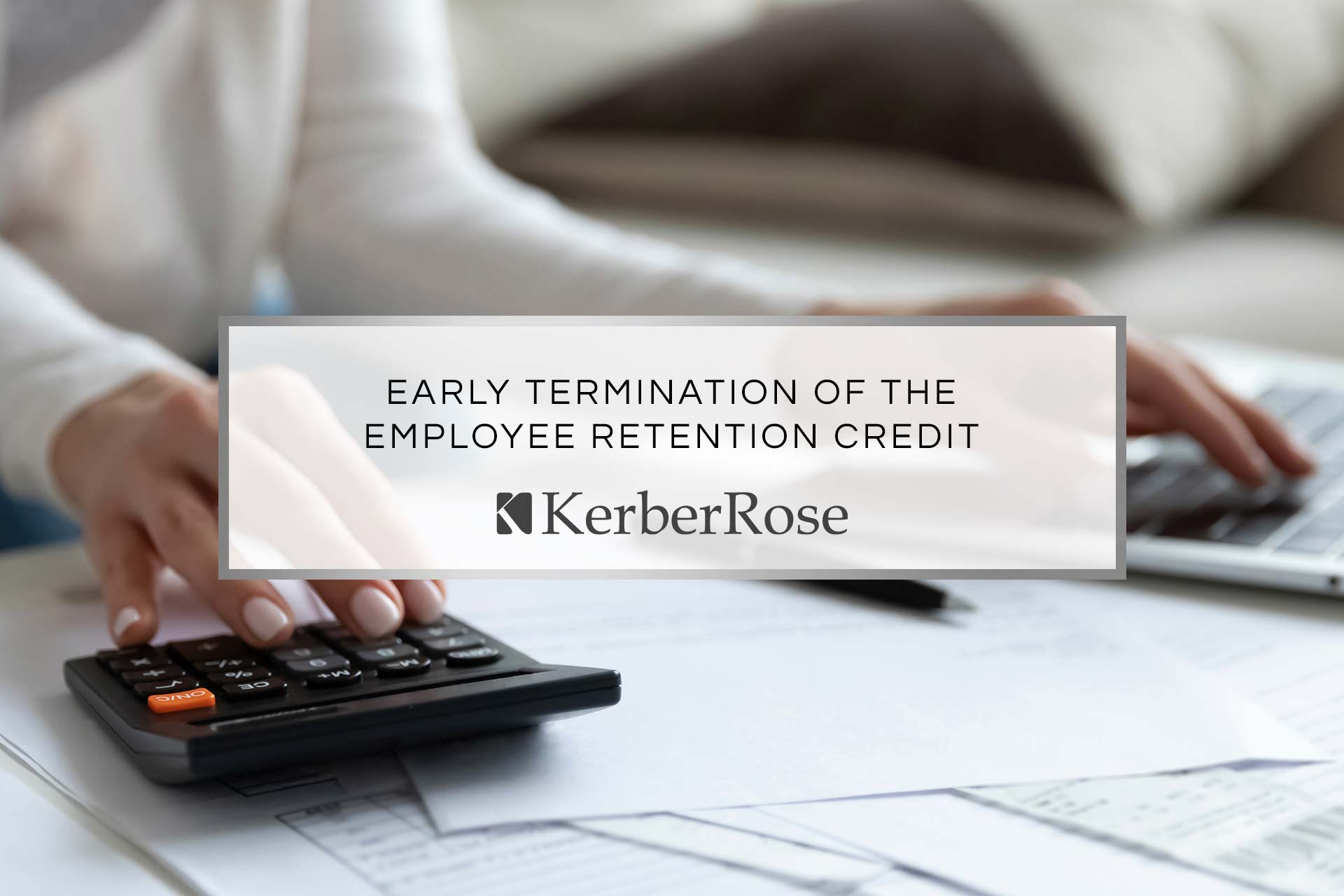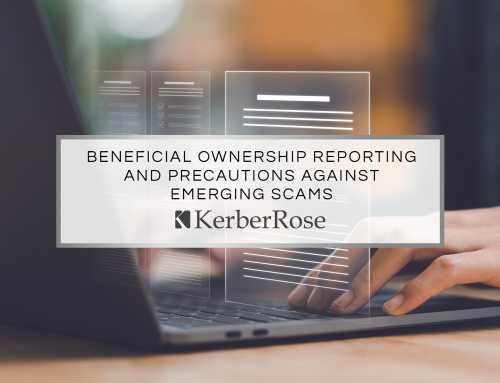Employee Retention Credit: What You Need to Know
With the passage of the Infrastructure Investment and Jobs Act (IIJA), or the bipartisan infrastructure bill, most employers are no longer eligible for the Employee Retention Credit (ERC). The IIJA has limited the ERC to employers categorized as a recovery startup business. Thus, according to IRS issued guidance, all wages paid after September 30, 2021 by an employer not classified as a startup business are no longer eligible for the ERC. Here’s what you need to know about your eligibility and what your next steps should be.
What is a Recovery Startup Business?
To be considered as a recovery startup business, a business must meet the following criteria:
- Operations started on or after February 15, 2020.
- Average annual gross receipts do not exceed one million dollars.
All businesses that do not meet the above criteria cannot apply the ERC to any wages paid in the fourth quarter. However, all businesses meeting the above criteria may still be eligible to receive the ERC.
What if I No Longer Qualify and Received Advance Payments?
If a business is not considered a recovery startup business and received advance payments for fourth quarter wages in 2021, the business must repay those amounts by the due date of the associated employment tax returns to avoid failure to pay penalties.
What if I No Longer Qualify and Already Reduced My Employment Tax Deposits?
In expectation of claiming the ERC for the fourth quarter of 2021, some now ineligible employers may have already reduced their employment tax deposits on or before December 20, 2021. Per IRS issued guidance, these businesses will not have to pay a failure to deposit penalty if the following conditions are met:
- Deposits were reduced in expectation of the ERC, consistent with the rules listed in Notice 2021-24.
- The employer made a deposit of the amount retained in expectation of the ERC on or before the relevant due date for wages paid on December 31, 2021 (whether or not the employer paid wages on that date). Due dates for deposits vary in accordance with the employer’s deposit schedule.
- The employer reported the tax liability associated with the termination of the ERC on the relevant employment tax return or schedule that covers the time from October 1, 2021 to December 31, 2021. For more information on how to report a tax liability, employers should consult instructions on the relevant employment tax return or schedule.
Failure to deposit penalties are not waived for ineligible employers if deposits were reduced after December 20, 2021.
Employers who do not qualify for relief can choose to reply to a penalty notice with an explanation. The IRS will consider whether or not there is reasonable cause for relief.
Form 7200: Information and Tips
Eligible employers file Form 7200 to request advance payment of the ERC. Some businesses have already filed Form 7200, which is used to request an advance payment of the ERC for the fourth quarter. In cases where the IRS has not yet processed Form 7200, they will use the taxpayer’s indication of whether it is a recovery startup business to accept or reject the ERC claim.
Some now ineligible employers may have already made an advance payment of the ERC. These employers are still required to include the advanced payment on the relevant line on its employment tax return. In some instances, this may mean the employer will have a balance due when the tax return is filed.
Filing Form 7200 in light of the IIJA can be complex and confusing. Below are some more tips from the IRS to help navigate this process:
- The last day to file Form 7200 to request an advanced payment is either the date you filed your employment tax return or January 31, 2022, whichever is earlier.
- The IRS will no longer accept Form 7200 submissions after January 31, 2022.
- Submit 7200 on its own. Other information will not be considered during processing and may slow down the process.
- If you have already requested or received funds, report them on Form 7200.
- Do not submit a duplicate Form 7200.
Contact a KerberRose Trusted Advisor for questions on tax-related provisions within the IIJA.
Employee Retention Credit: What You Need to Know
With the passage of the Infrastructure Investment and Jobs Act (IIJA), or the bipartisan infrastructure bill, most employers are no longer eligible for the Employee Retention Credit (ERC). The IIJA has limited the ERC to employers categorized as a recovery startup business. Thus, according to IRS issued guidance, all wages paid after September 30, 2021 by an employer not classified as a startup business are no longer eligible for the ERC. Here’s what you need to know about your eligibility and what your next steps should be.
What is a Recovery Startup Business?
To be considered as a recovery startup business, a business must meet the following criteria:
- Operations started on or after February 15, 2020.
- Average annual gross receipts do not exceed one million dollars.
All businesses that do not meet the above criteria cannot apply the ERC to any wages paid in the fourth quarter. However, all businesses meeting the above criteria may still be eligible to receive the ERC.
What if I No Longer Qualify and Received Advance Payments?
If a business is not considered a recovery startup business and received advance payments for fourth quarter wages in 2021, the business must repay those amounts by the due date of the associated employment tax returns to avoid failure to pay penalties.
What if I No Longer Qualify and Already Reduced My Employment Tax Deposits?
In expectation of claiming the ERC for the fourth quarter of 2021, some now ineligible employers may have already reduced their employment tax deposits on or before December 20, 2021. Per IRS issued guidance, these businesses will not have to pay a failure to deposit penalty if the following conditions are met:
- Deposits were reduced in expectation of the ERC, consistent with the rules listed in Notice 2021-24.
- The employer made a deposit of the amount retained in expectation of the ERC on or before the relevant due date for wages paid on December 31, 2021 (whether or not the employer paid wages on that date). Due dates for deposits vary in accordance with the employer’s deposit schedule.
- The employer reported the tax liability associated with the termination of the ERC on the relevant employment tax return or schedule that covers the time from October 1, 2021 to December 31, 2021. For more information on how to report a tax liability, employers should consult instructions on the relevant employment tax return or schedule.
Failure to deposit penalties are not waived for ineligible employers if deposits were reduced after December 20, 2021.
Employers who do not qualify for relief can choose to reply to a penalty notice with an explanation. The IRS will consider whether or not there is reasonable cause for relief.
Form 7200: Information and Tips
Eligible employers file Form 7200 to request advance payment of the ERC. Some businesses have already filed Form 7200, which is used to request an advance payment of the ERC for the fourth quarter. In cases where the IRS has not yet processed Form 7200, they will use the taxpayer’s indication of whether it is a recovery startup business to accept or reject the ERC claim.
Some now ineligible employers may have already made an advance payment of the ERC. These employers are still required to include the advanced payment on the relevant line on its employment tax return. In some instances, this may mean the employer will have a balance due when the tax return is filed.
Filing Form 7200 in light of the IIJA can be complex and confusing. Below are some more tips from the IRS to help navigate this process:
- The last day to file Form 7200 to request an advanced payment is either the date you filed your employment tax return or January 31, 2022, whichever is earlier.
- The IRS will no longer accept Form 7200 submissions after January 31, 2022.
- Submit 7200 on its own. Other information will not be considered during processing and may slow down the process.
- If you have already requested or received funds, report them on Form 7200.
- Do not submit a duplicate Form 7200.
Contact a KerberRose Trusted Advisor for questions on tax-related provisions within the IIJA.
Employee Retention Credit: What You Need to Know
With the passage of the Infrastructure Investment and Jobs Act (IIJA), or the bipartisan infrastructure bill, most employers are no longer eligible for the Employee Retention Credit (ERC). The IIJA has limited the ERC to employers categorized as a recovery startup business. Thus, according to IRS issued guidance, all wages paid after September 30, 2021 by an employer not classified as a startup business are no longer eligible for the ERC. Here’s what you need to know about your eligibility and what your next steps should be.
What is a Recovery Startup Business?
To be considered as a recovery startup business, a business must meet the following criteria:
- Operations started on or after February 15, 2020.
- Average annual gross receipts do not exceed one million dollars.
All businesses that do not meet the above criteria cannot apply the ERC to any wages paid in the fourth quarter. However, all businesses meeting the above criteria may still be eligible to receive the ERC.
What if I No Longer Qualify and Received Advance Payments?
If a business is not considered a recovery startup business and received advance payments for fourth quarter wages in 2021, the business must repay those amounts by the due date of the associated employment tax returns to avoid failure to pay penalties.
What if I No Longer Qualify and Already Reduced My Employment Tax Deposits?
In expectation of claiming the ERC for the fourth quarter of 2021, some now ineligible employers may have already reduced their employment tax deposits on or before December 20, 2021. Per IRS issued guidance, these businesses will not have to pay a failure to deposit penalty if the following conditions are met:
- Deposits were reduced in expectation of the ERC, consistent with the rules listed in Notice 2021-24.
- The employer made a deposit of the amount retained in expectation of the ERC on or before the relevant due date for wages paid on December 31, 2021 (whether or not the employer paid wages on that date). Due dates for deposits vary in accordance with the employer’s deposit schedule.
- The employer reported the tax liability associated with the termination of the ERC on the relevant employment tax return or schedule that covers the time from October 1, 2021 to December 31, 2021. For more information on how to report a tax liability, employers should consult instructions on the relevant employment tax return or schedule.
Failure to deposit penalties are not waived for ineligible employers if deposits were reduced after December 20, 2021.
Employers who do not qualify for relief can choose to reply to a penalty notice with an explanation. The IRS will consider whether or not there is reasonable cause for relief.
Form 7200: Information and Tips
Eligible employers file Form 7200 to request advance payment of the ERC. Some businesses have already filed Form 7200, which is used to request an advance payment of the ERC for the fourth quarter. In cases where the IRS has not yet processed Form 7200, they will use the taxpayer’s indication of whether it is a recovery startup business to accept or reject the ERC claim.
Some now ineligible employers may have already made an advance payment of the ERC. These employers are still required to include the advanced payment on the relevant line on its employment tax return. In some instances, this may mean the employer will have a balance due when the tax return is filed.
Filing Form 7200 in light of the IIJA can be complex and confusing. Below are some more tips from the IRS to help navigate this process:
- The last day to file Form 7200 to request an advanced payment is either the date you filed your employment tax return or January 31, 2022, whichever is earlier.
- The IRS will no longer accept Form 7200 submissions after January 31, 2022.
- Submit 7200 on its own. Other information will not be considered during processing and may slow down the process.
- If you have already requested or received funds, report them on Form 7200.
- Do not submit a duplicate Form 7200.
Contact a KerberRose Trusted Advisor for questions on tax-related provisions within the IIJA.




